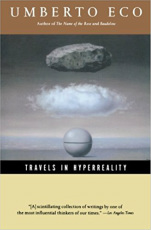
In Eco's words, 'The worst thing that happened to Thomas Aquinas in the course of his career was not his death ... Nor was it what happened three years after his death, when the Archbishop of Paris, Etienne Tempier, published a list of heretical propositions (two hundred and nineteen of them) that included the majority of the theses of the followers of Averroes, ... and twenty propositions clearly attributable to him, Thomas, the angelic doctor himself, son of the lordly family of Aquino. ... No, the disaster that ruined the life of Tommaso d'Aquino befell him in 1323, two years after the death of Dante and was perhaps, also, to some degree, attributable to the poet: in other words, when John XXII decided to turn Tommaso into Saint Thomas Aquinas. ... It's the moment when the big arsonist is appointed Fire Chief.'
Thomas, Eco argues, was a subversive, unique, and original thinker (it's important to remember that Aristotle was persona non grata at this point in Church history and in Christian thought, and that most of the 'heretical propositions' to which Eco refers stem ultimately from Aristotle), and what Thomas did, better than anyone, was to think through, in an original manner, all the conceptual, philosophical, and theological problems of his day. What was most impressive, Eco argues, was Thomas's originality. But once Thomas is codified by the church, Eco argues, intellectual progress in the Church more or less hit pause, as it was then believed that all the problems were solved, and there was nothing else to really do, except keep rehashing the Thomistic project.
 RSS Feed
RSS Feed